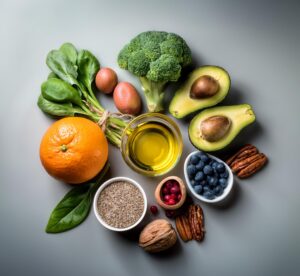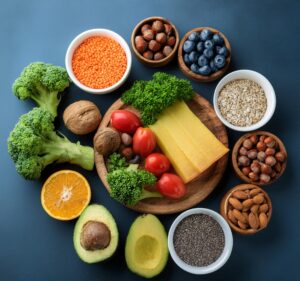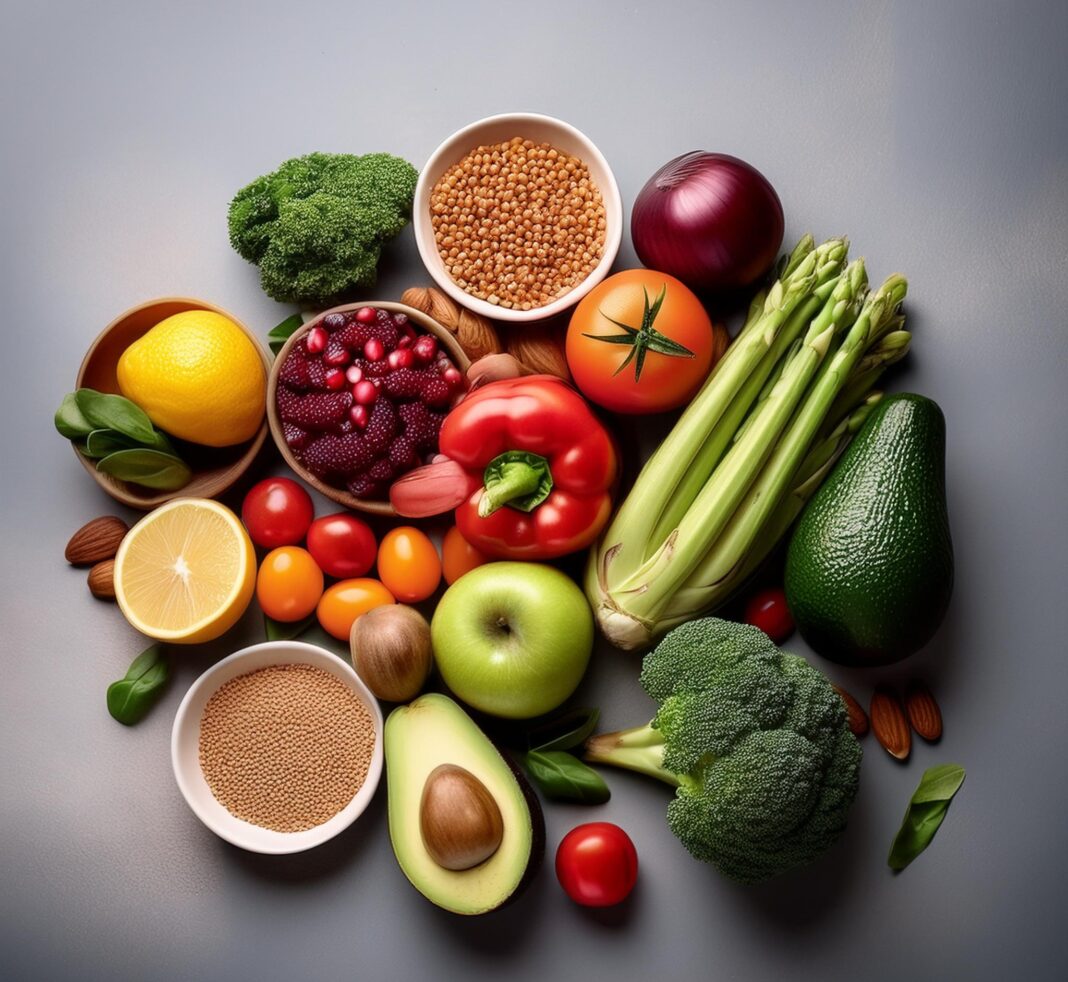Introduction to Micronutrient-rich Foods:
Micronutrients are dietary components such as vitamins and minerals that are crucial to the lovable health of the body though needed in quantites minimal. Contrary to macronutrients like protein, carbohydrates and fats, micronutrients provide no energy for use by the body. They nevertheless assist in several physiological activities.
Types of Micronutrients:
Vitamins:
Minerals:
Functions of Micronutrients:
Vitamins:
- Enhance immune responses
- Aid in physical and psychomotor development
- Help in maintaining healthy skin.
Minerals:
- Help in bone and tooth formation
- Control the actions of various processes in the body.
- Control how much water is in the body.
Adding and eating a wide variety of foods rich in essential nutrients can be useful in satisfying the critical nutritional requirements.
The Importance of Micronutrient-rich Foods for Health:
Micronutrients are necessary in optimally enhancing overall health. These nutrients enhance:
- Immune System: Several vitamins, particularly A, C and E, help fight infections.
- Bone Health: Calcium, Vitamin D and magnesium contributes mainly to the strength of the bones.
- Energy Production: The role of the B vitamins is very important for proper energy metabolism.
- Cognitive Function: It is provided that iron and iodine are of importance to brain health.
- Antioxidant Functions: Selen and Ascorbic acid are known to act against oxidative stress.
Lack of proper nourishment of these micronutrients leads to deficiency diseases and several other health issues.
Various Vitamins in Hydration and Their Health Benefits:
Vitamin-A:
- Helps enhance eye sight and immunity.
- Necessary for cell reproduction and specialization.
- It is retrieved from liver, carrot, and green vegetables.
Vitamins-C
- Being a free radical detector it is very important.
- It is required for collagen formation and healing of wounds.
- It is found in citrus fruits, strawberries, and bell peppers.
Vitamins-D
- It is responsible for calcium and phosphorus homeostasis
- Crucial for the health of bones and teeth.
- It is derived from fatty fish, fortified milk and sunlight.
Vitamins-E
- It protects cell from oxidative stress.
- Immunity in the body is also provided by it.
- It is found in nuts, seeds and green vegetables.
Vitamins-K
- It is very important in the processes that remove blood clot.
- It provides calcium and helps in strengthening of bones.
- It is found in cucumber, broccoli, brussel sprouts and kale.
Micronutrient-rich Foods: Minerals Category and Functions
Essential minerals that are required by the body are of paramount importance in the maintenance of body functions.
- Calcium: Important for the bone, for proper contraction and relaxation of the muscle and for signal transferring by the nerves.
- Magnesium: It’s a cofactor in over 300 biochemical processes, in ATP production, and protein synthesis.
- Potassium: It is an essential nutrient to facilitate proper water balance within the body, coordinate muscle contractions, and transmit nerve impulses.
- Iron: It plays a critical role in carrying oxygen in the blood as well as cell energy creation and brain functioning.
- Zinc: Promotes immunity, tissue healing, and the formation of DNA.
- Selenium: Critically involved for the proper functions of the thyroid gland, fight against free radicals, and fertility.
- Iodine: Is very important in the synthesis of thyroid hormones responsible for metabolism control.
Micronutrient Deficiency: Signs and Symptoms
Cognitive, emotional, and physical symptoms can all be traced back to the deficiency of certain micronutrients in the body. Specific signs may differ on the nutrient that is not present – for example:
- Iron: Excessive tiredness, pallid complexion, breathlessness, passive dizziness, cold extremities.
- Vitamin D: Pain in the bones, muscles are weak; chance of getting broken bones increases.
- Vitamin B12: Anemia, peripheral neuropathy, amnesia, forgetfulness.
- Vitamin A: Night blindness, dry skin, and more last upper respiratory tract infections.
- Magnesium: Sheer muscle cramps, mental illness, diminished bone mass, tiredness.
Vegetables: A Beneficial Source of Micronutrients
Vegetables is one of the basic foods which comprise a lot of necessary micronutrients for the health of an individual. These are as follows –
- Leafy greens: Foods like spinach, kale and Swiss chard are abundant in vitamin A, vitamin C, vitamin K and vitamin B9.
- Cruciferous vegetables: Broccoli, Brussels sprouts, and cauliflower will supply you with vitamins C, K and a range of B vitamins.
- Root vegetables: Carrots, sweet potatoes and beets will provide one with vitamins A, C and trace elements such as potassium and manganese.
With adequate variety of vegetables in the diet, one is able to achieve their daily requirement for micronutrients that are necessary for health.
Fruits for Sale with the Essential Vitamins and MInerals:
Fruits are quite important as sources of these vitamins and minerals that are important for health and even more important for the human body structure and functions as a whole.
- Citrus Fruits: Oranges, lemons or grapefruits, which contain Vitamin C which enhances immune health.
- Berries: Blueberries, strawberries and raspberries contain nitric oxide and Vitamin K.
- Bananas: Rich in potassium, bananas help in heart and muscle function.
- Apples: Provide Dietary fibers, Vitamin C and antioxidants.
- Kiwi: Containing Vitamins E, folate and Vitamin C.
Correct the omission and the fruit intake shall help advance health.
Whole grains Density rich in Micronutrient-rich Foods:
Whole grains still serve as the great source of almost every essential micronutrient including B-vitamins, iron and magnesium. They also contain dietary fibers which help in digestion.
Below Here Are The Key Micronutrient-rich Foods dense Whole Grains:
- Quinoa: As for this seeds crop, its magnesium, manganese and phosphorus contents are very high.
- Farro: Levels are particularly high in iron, zinc, and B vitamins.
- Brown Rice: More fattening manganese is supplied, as well as combined selenium and magnesium.
- Buckwheat: Contains copper, magnesium, and dietary fiber.
Whole grains make a considerable percentage of the contributions, which enhances overall well-being.
Nuts and seeds micronutrients:
Nuts and seeds are among the most nutrient-saturated foods they are loaded with a variety of micro nutrients.
- Healthy Fats: They contain mono and polyunsaturated www. Pexels.com Pg.63 fatty acids which protect the heart.
- Fiber: They help in digestion and contribute in controlling the sugar levels.
Vitamins and Minerals:
- Vitamin E: One of the vitamins which when found in almonds and sunflower seed is used as an antioxidant.
- Magnesium: This is present in pumpkin seeds, cashew nuts and is needed for contraction and relaxation of muscles and many other nerve functions.
- Zinc: Within the sesame seeds, which is required in immune Californazinc.
These make nuts and seeds basic components of proper nutrition.
Micronutrient-rich Foods of Dairy Products:
Dairy products are seen in most of the diets because of their sequent micronutrient benefits in them. For example includes: Key items include:
- Milk: This is the 2 in 1 source of calcium and vitamin D especially needed for the bone health.
- Cheese: This one is particularly funny. Not only that, they do eat cheese made up of calcium, rich in vitamin K2 and phosphorus which are critical for the basic bone structure.
- Yogurt: Probiotic enriched yogurts along with calcium, magnesium content and vitamins B2 and B12.
- Butter: Fat includes valuable vitamins like A, D, E and K that are useful for performing different functions in the body.
- Cottage Cheese: It is a good source of protein, calcium, vitamin B12, and selenium.
These nutrients are very helpful in maintaining sound bones, increase immunity as well as assists in overall health status.
Animal Derived Foods with Micronutrients:
Animal-derived foods are good sources of important vitamins and minerals. They, however, tend to offer these vitamins and minerals in more biologically useful forms.
- Liver: One of the best sources of dietary vitamin A, iron, and folate.
- Eggs: They provide vitamins B12, D and selenium.
- Fish: Offers omega-3 oil, vitamin D and iodine.
- Red Meat: Mainly contains iron and zinc and vitamin B12
- Dairy Products: Calcium, vitamin D, and potassium are found in these foods.
- Shellfish: Offers mostly vitamin B12, iron, and zinc.
The health of an individual is improved further by the provision of necessary micronutrients particularly in form that is more easily utilized.
Nutrition Education – Including Healthy Micronutrient Enriched Foods into Daily Nutrition
Integrating micronutrient dense foods in the daily diet will help to improve health. Here are certain useful suggestions:
Breakfast:
- Spinach or kale may be added in smoothies.
- Berries and nuts can be used to enhance the flavor of oatmeal.
Lunch:
- For salads, ask for various kinds of vegetables, preferably different colors.
- Incorporate dairy or meat such as gizzard or legumes.
Dinner:
- Try a colored grain-quinoa or brown rice for incidences white rice.
- Order a bowl full of variety vegetables- steamed or roasted.
Snacks:
- Fruits or nuts or seeds would make a good choice.
- Yogurt with flaxseeds or chia seeds can also be considered.
These approaches help to provide the body with adequate essential vitamins and minerals irrespective of the individual’s food preferences.
Conclusion: Ensuring Overall Body Health with Adequate Nutrition
The right nutrition will support living healthy as well as even help in achieving the ideal weight. Use of nutritious foods mainly healthful to the body with vitamins and minerals are suitable food for human beings inside the body.
Important and Their Forms:
Vitamins:
- Vitamin A: Carrots, sweet potatoes, spinach
- Vitamin C: oranges, strawberries, bell peppers
- Vitamin D: Salmon, milk, sun
Minerals:
- Calcium: Dairy, green vegetables, nuts
- Iron: Meat, legumes, soya
- Magnesium: Nuts, seeds, whole grain foods
Health Benefits:
- Enhance the Immune System
- Relieve Fatigue
- Prevent Bone Loss
- Improve Cognitive Development
Professionals in the healthcare industry recommend safe and healthy nutrition, which includes proper food containing a variety of nutrients suitable for one’s body.

